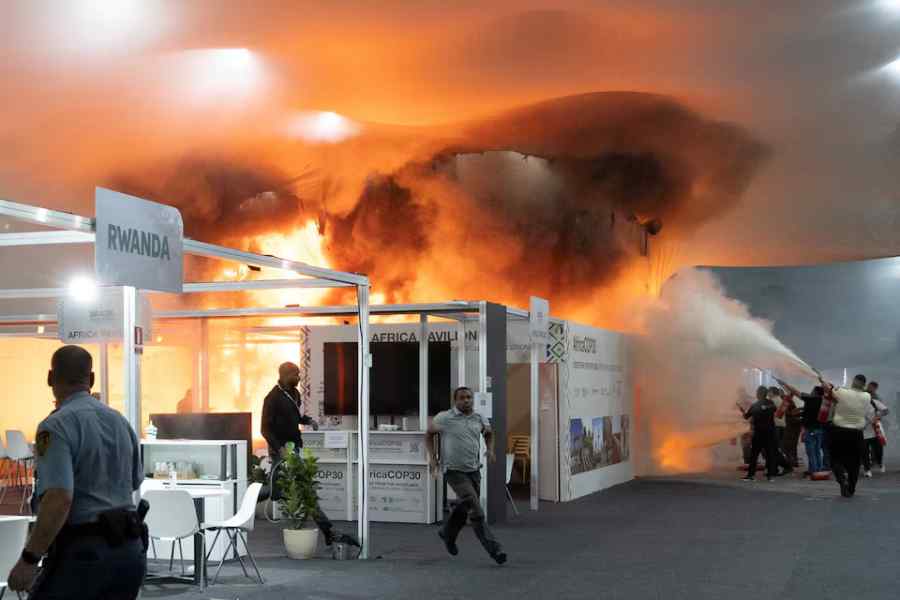Talks at the COP30 climate summit in Brazil were disrupted on Thursday after a fire broke out in the venue, injuring at least 21 people and triggering an evacuation just as negotiators were hunkering down to try to land a deal to strengthen international climate efforts.
The fire broke out at around 2 pm on Thursday at the 'Blue Zone', where all meetings, negotiations, country pavilions, media centre and offices of all high-profile dignitaries are housed, including the main plenary hall.
As soon as news of the fire spread, people ran out of all exit gates for safety. The authorities closed the venue for a thorough safety inspection and reopened it after more than six hours at 8:40 pm, sans the country pavilions -- the area which caught fire.
"...according to updated data as of 6 pm this Thursday, 21 people have received medical care as a result of the fire that affected the Blue Zone of the event," the Brazilian Ministry of Health said in a statement.
Of the total cases, 19 are related to smoke inhalation and two to anxiety episodes following the incident. There have been no reports of individuals sustaining burn injuries from the flames, it added.
"Patients were promptly assisted and 12 have already been discharged. The remaining individuals are receiving appropriate care in health facilities in Belem and in a designated referral unit for such cases," the statement said.
Municipal, state and federal health teams continue to monitor and follow up on the medical assistance and health status of those affected, it added.
It is learnt that UN Secretary-General Antonio Guterres was present at the venue and promptly evacuated by the United Nations Department of Safety and Security (UNDSS) protection detail.
India's Environment Minister Bhupender Yadav was also present with the Indian delegation inside the Blue Zone when the fire broke out, but he and other officials safely exited the venue, a spokesperson of the ministry told PTI.
In a mail to all participants, the United Nations Framework Convention on Climate Change (UNFCCC) said that following a comprehensive safety assessment, the venue has been thoroughly inspected and deemed fully safe.
"Brazilian authorities have restored all working conditions on the conference premises, secured the post-fire operating permit from the Fire Department and formally returned the area to the UNFCCC," it added.
Antonio Guterres had appealed earlier in the day for a deal from the summit in the Amazon city of Belem, welcoming calls from some for clarity on the hotly disputed subject of weaning the world off fossil fuels.
DRAFTING DOCUMENTS, DEADLINES MISSED
Negotiations were not expected to resume until Friday morning, a source told Reuters. Consultations between the presidency and negotiating blocs could continue on Thursday night, subject to safety assessments at the venue.
The summit already missed a self-imposed Wednesday deadline to secure agreement among the countries present on issues including how to increase climate finance and shift away from fossil fuels.
Brazil circulated a draft proposal for part of the COP30 deal among some governments on Thursday, which did not include a roadmap on transitioning away from fossil fuels.
Emissions from burning fossil fuels trap heat in the earth's atmosphere and are by far the biggest contributor to warming.
The draft proposal, seen by Reuters, included other elements for a deal. It said countries would call to triple the financing available to help nations adapt to climate change by 2030, from 2025 levels. However, it did not specify whether this money would be provided directly by wealthy governments, or other sources including development banks or the private sector.
Brazil's COP30 presidency did not immediately respond to a request for comment on the draft text.
Some negotiators said they had been working on the draft text shortly before the COP venue was evacuated due to the fire. Others said it had not been shared with them.
It is common at COP summits for the presidency to thrash out a text with small groups of countries, before bringing all governments together to greenlight the final deal.
FOSSIL FUEL RIFT
The two-week negotiation has become hung up on two issues - the future of fossil fuels and the delivery of climate finance - that expose criss-crossing fault lines between negotiating blocs from rich Western countries, oil producers and smaller states most vulnerable to climate change.
Taking their cue from Brazil, dozens of countries including both developed and developing nations have mounted a push for a roadmap setting out how countries should transition away from fossil fuels.
Others, including some fossil fuel-producing nations, are resisting.
The COP28 climate summit in 2023 agreed, after protracted discussion, to a transition, but nations have not mapped out how - or when - it will happen.
"I am perfectly convinced that a compromise is possible," Guterres said.
ADAPTING TO CHANGE
Another major sticking point in the negotiations is a reluctance among some richer nations to guarantee financing to help poorer countries adapt to a changing climate, according to three sources involved in the talks.
Developing countries are already deeply mistrustful of a $300 billion climate finance pledge made last year at the COP29 conference in Baku, particularly as the United States withdraws from climate cooperation under President Donald Trump.
Some existing climate finance has been directed to strange projects, including some that are funneling billions of dollars back to rich nations, according to previous Reuters reporting.
"Right now, our people are losing their lives and livelihoods from storms of unprecedented strength which are being caused by warming seas," said Steven Victor, Minister of Agriculture, Fisheries and the Environment for the Pacific island nation of Palau.
"If we leave Belem without a transformative outcome on adaptation for the world's most vulnerable, it will be a failure," he said.
European officials have said they agree adaptation financing is important, but that they were not authorized to agree to new targets.











